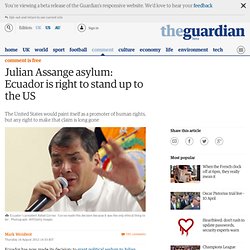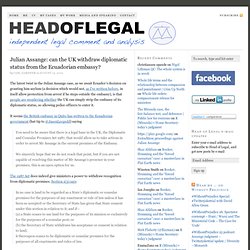

Julian Assange to issue statement 'in front' of embassy haven. Julian Assange asylum: Ecuador is right to stand up to the US. Ecuador has now made its decision: to grant political asylum to Julian Assange.

This comes in the wake of an incident that should dispel remaining doubts about the motives behind the UK/Swedish attempts to extradite WikiLeaks founder Julian Assange. On Wednesday, the UK government made an unprecedented threat to invade Ecuador's embassy if Assange is not handed over. Such an assault would be so extreme in violating international law and diplomatic conventions that it is difficult to even find an example of a democratic government even making such a threat, let alone carrying it out. When Ecuadorian foreign minister Ricardo Patiño, in an angry and defiant response, released the written threats to the public, the UK government tried to backtrack and say it wasn't a threat to invade the embassy (which is another country's sovereign territory). But what else can we possibly make of this wording from a letter delivered by a British official? Why is this case so significant? Julian Assange Granted Asylum By Ecuador; Britain Vows To Extradite Him To Sweden.
WikiLeaks : Assange obtient l’asile politique, mais son extradition reste d'actualité pour Londres. WIKILEAKS: Surveillance Cameras Around The Country Are Being Used In A Huge Spy Network. Asylum or not, Assange may not leave UK. Published time: August 15, 2012 20:08 Edited time: August 19, 2012 17:04 Ecuadorean Minister of Foreign Affairs Ricardo Patino speaks during a press conference in Quito. (AFP Photo / Rodrigo Buendia) British authorities have “warned” Ecuador that they could raid its embassy and arrest Julian Assange if he is not handed over. The Ecuadorian Foreign Minister responded by saying such a move would be a “flagrant violation” of international law. Ecuador received a "direct" threat from the authorities in London that they are prepared to storm the Ecuadorian Embassy and arrest Assange if he is not delivered to their custody. The letter received by the Ecuadorian Embassy stated that British authorities have a legal basis, founded in the Diplomatic and Consular Act of 1987, to arrest Assange on the Embassy’s premises.
No threat, however, would force the country to give up the universal principles under which it continues to offer Assange protection, the Ecuadorian Foreign Ministry stated. #assange #ecuador #wikileaks embassy live via @alburyj #London2012. Julian Assange: can the UK withdraw diplomatic status from the Ecuadorian embassy? The latest twist in the Julian Assange case, as we await Ecuador’s decision on granting him asylum (a decision which would not, as I’ve written before, in itself allow protection from arrest if he steps outside the embassy), is that people are wondering whether the UK can simply strip the embassy of its diplomatic status, so allowing police officers to enter it.

It seems the British embassy in Quito has written to the Ecuadorian government (hat tip to @JasonLeopold) saying You need to be aware that there is a legal base in the UK, the Diplomatic and Consular Premises Act 1987, that would allow us to take actions in order to arrest Mr Assange in the current premises of the Embassy.We sincerely hope that we do not reach that point, but if you are not capable of resolving this matter of Mr Assange’s presence in your premises, this is an open option for us. The 1987 Act does indeed give ministers a power to withdraw recognition from diplomatic premises. Section 1(3) says. Wikileaks and Freedom of internet.
WikiLeaks révèle TrapWire - Réseau mondial de surveillance de tous les citoyens. INFORMATION : la publicité diffusée sur ce site est l'unique source de revenus, permettant de vous proposer gratuitement ce contenu en finançant le travail journalistique.

Si vous souhaitez la survie d'un web libre et gratuit, merci de désactiver votre bloqueur de publicité ou de mettre UnderNews en liste blanche. Vous souhaitez aider tout en limitant la publicité ? Faites un don ! En savoir plus Publié par UnderNews Actu Le site de WikiLeaks a mis en évidence ces derniers jours un processus d’espionnage des citoyens à l’échelle mondiale, concernant 25 pays, et parmi eux le Canada et les États-Unis. Ce projet s’appelle TrapWire et est déjà utilisé dans des villes test aux États-Unis, sans que les citoyens en soient informés.
Depuis ces révélations très graves, le site WikiLeaks est attaqué par un groupe très probablement lié au gouvernement des USA, le groupe AntiLeaks, qui se réclame sur Twitter de ces attaques DDOS sur les serveurs de WikiLeaks. Government surveillance system Trapwire could be illegal. TechWeekEurope UKJulian Assange: Unlikely I'll Obey Surrender Notice. Julian Assange is unlikely to comply with a surrender notice sent to him yesterday by the Metropolitan Police Service.

The WikiLeaks founder told BBC Newsnight it was highly unlikely he would submit to the Met’s request to turn himself in to the nearest police station. The Embassy of Ecuador confirmed yesterday that officers from the Met delivered a letter to Assange, but said it was still assessing his application for asylum. Assange has been seeking asylum in Ecuador since he lost his final plea to avoid extradition from the UK to Sweden, where he currently faces allegations of raping a woman and sexually molesting and coercing another in Stockholm in August 2010. He claims the sex was consensual and that the accusations against him are politically motivated.